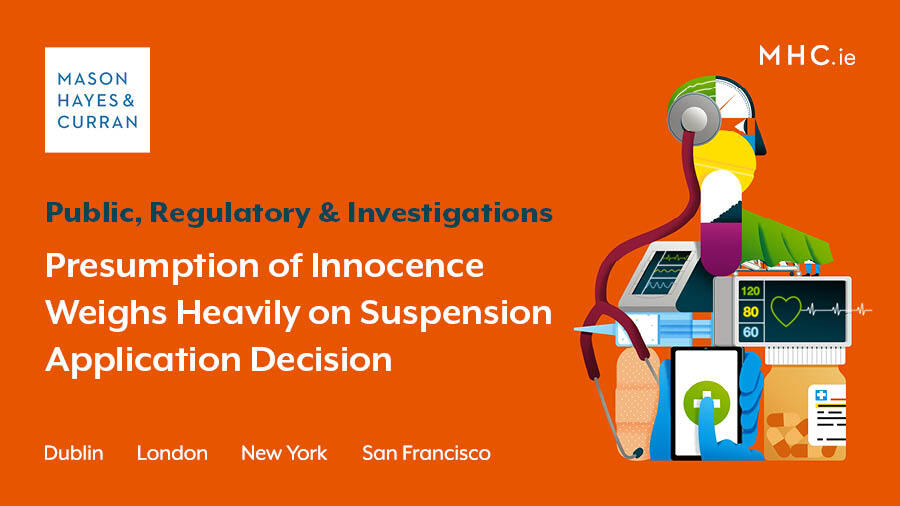
What does the Court consider when deciding whether to grant a Section 60 application? This was considered in Medical Council v A Medical Practitioner, which involved an application under Section 60 of the Medical Practitioners Act 2007. The Medical Council sought an interim suspension against the doctor after he had notified the Council of ongoing criminal proceedings against him. Prior to this, the doctor had agreed to provide an undertaking not to examine female patients without a chaperone until the Council had determined whether to make a Section 60 application under the 2007 Act.
Council’s application
The Council decided to a make suspension application as it deemed that the undertaking by the doctor to be accompanied during examinations was not sufficient to protect the public, having regard to the enforcement and supervisory issues an undertaking like this could entail. Subsequently, the application was made to the High Court.
Section 60 of the Medical Practitioners Act 2007 provides that the Council may make an application to the Court for an order suspending the registration of a medical practitioner if it considers that this is necessary to protect the public. The Court may make any orders to the medical practitioner or directions to the Council it considers appropriate. The case of O’Ceallaigh set out the various principles the Council must consider in deciding whether to bring an application, namely the nature of the complaint, strength of the case, and whether in the event of an adverse finding the appropriate sanction would be to strike off the practitioner either permanently or for a defined period.
In Medical Council v Waters, Irvine P noted that the Court must engage in a balancing exercise between the public interest and the need to protect the public against the constitutional rights of the practitioner to:
- Carry on their practice
- Earn a livelihood, and
- Avoid reputational damage arising from an interim suspension order
In deciding this case, the judge made reference to Irvine P’s explanation in the Waters case that the Court must engage in a balancing exercise when deciding on a Section 60 application. In addition, he noted that the presumption of innocence weighs heavily against granting a Section 60 order in circumstances such as these where the respondent is challenging the relevant criminal allegations. However, he rejected any argument that the presumption of innocence barred a Section 60 order or rendered it unconstitutional. Regarding the Council’s consideration of the O’Ceallaigh criteria, the Court held that its decision to make a Section 60 application was understandable. However, it was noted that the Court is not bound by the Council’s view and must consider whether a suspension order is necessary to protect the public.
The Court gave considerable weight to the respondent’s arguments that:
- Suspension would likely bring the respondent’s career to an end given his age
- He had no alternative income source, and
- His constitutional rights to a livelihood, to a good name, and to the presumption of innocence would be impacted
Additionally, the Court noted that since the implementation of the chaperoning policy, no complaints had been made. Considering these factors, the Court held that suspension went further than necessary, and that a set of court-ordered undertakings would be sufficient. The initial undertaking that the respondent only examine female patients with a chaperone present was retained and other undertakings such as adherence to a consent policy and provision of regular updates on criminal proceedings to the Council were added.
Conclusion
This case reinforces established case law such as Whelan and Bukhari, where the courts preferred to accept undertakings in similar circumstances rather than granting an interim suspension order. Specific to this case, the weight which the Court gave to the presumption of innocence is particularly notable. While the judge went to some lengths in emphasising that the presumption did not represent a bar to Section 60 orders, he did accept that it would weigh heavily against granting a suspension order.
For more information, contact a member of our Public, Regulatory & Investigations team.
The content of this article is provided for information purposes only and does not constitute legal or other advice.






